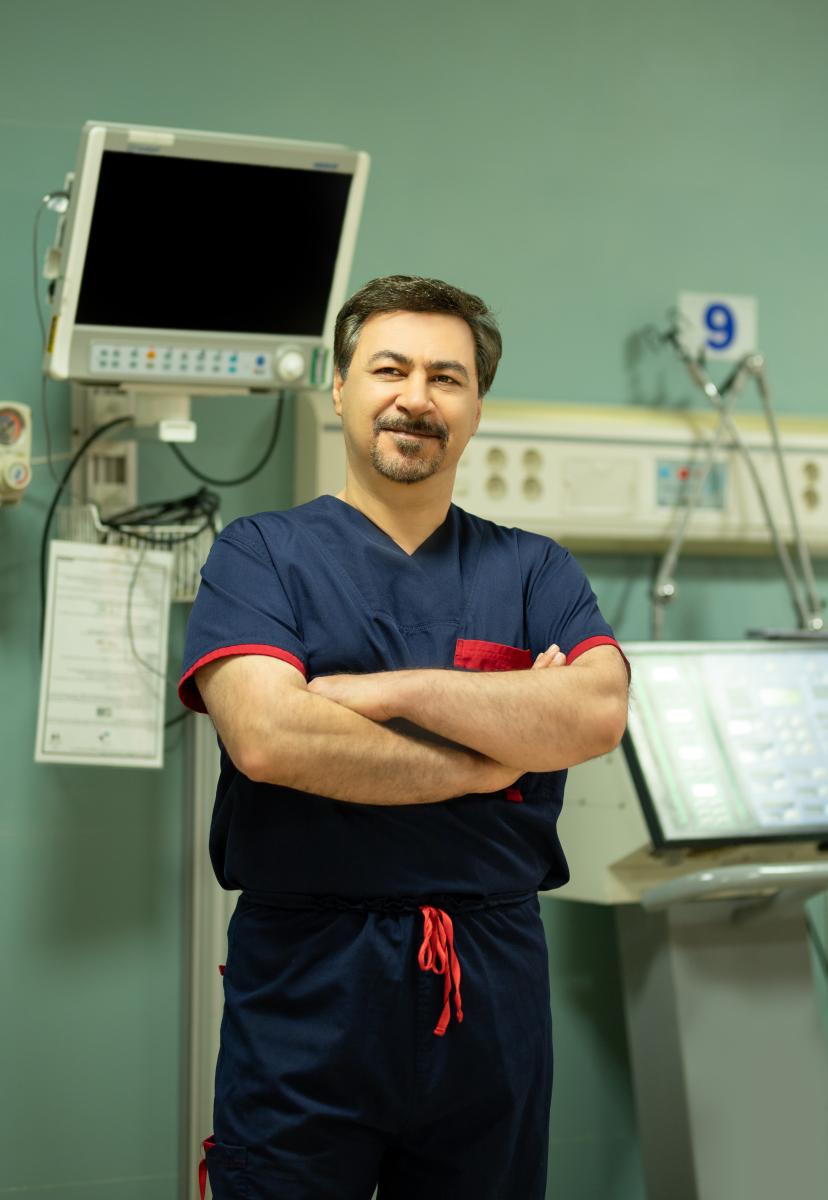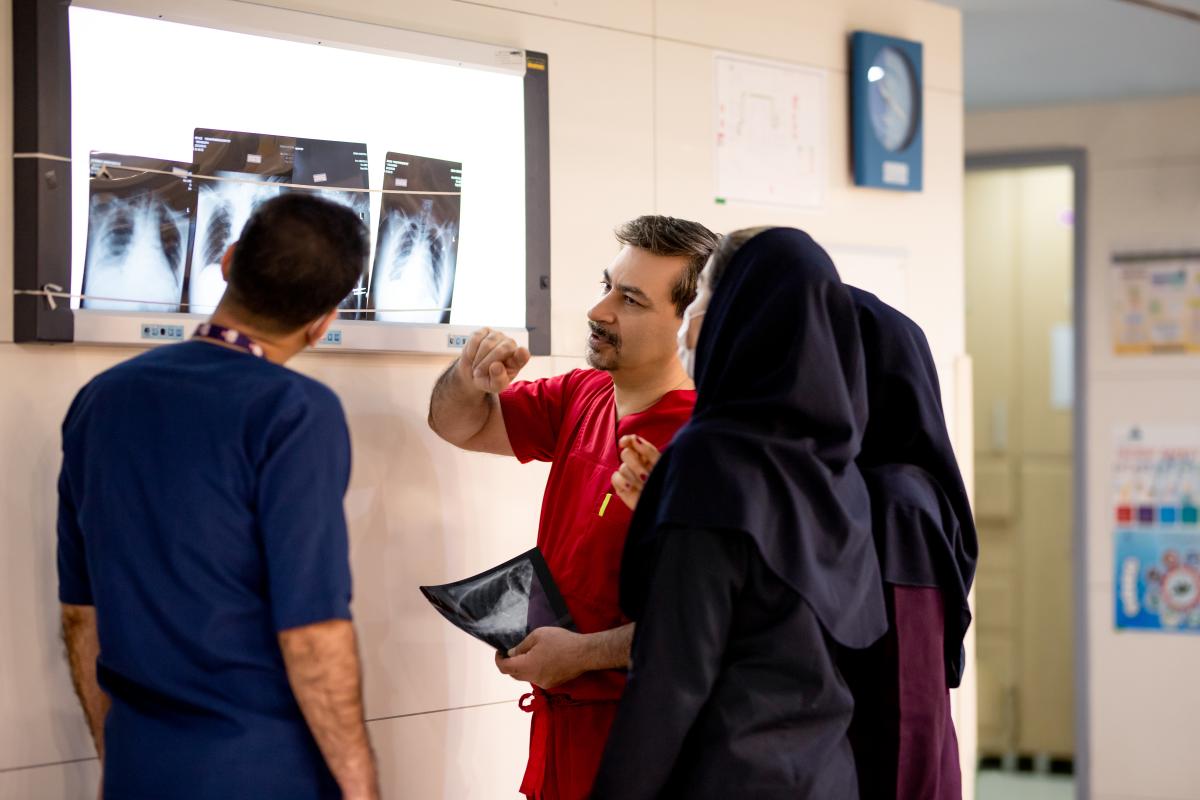ALERT!
This site is not optimized for Internet Explorer 8 (or older).
Please upgrade to a newer version of Internet Explorer or use an alternate browser such as Chrome or Firefox.
Featured Profile: Ahmad Ali Amirghofran
 Dr. Ahmad Ali Amirghofran was born in Tehran, Iran, and later moved with his family to the historic city of Shiraz, where he lives and practices medicine. His cardiac surgery training consisted of two years at Shiraz University of Medical Sciences, followed by an additional two years in London, where he trained in congenital heart surgery at Great Ormond Street Hospital and adult cardiac surgery at Middlesex Hospital.
Dr. Ahmad Ali Amirghofran was born in Tehran, Iran, and later moved with his family to the historic city of Shiraz, where he lives and practices medicine. His cardiac surgery training consisted of two years at Shiraz University of Medical Sciences, followed by an additional two years in London, where he trained in congenital heart surgery at Great Ormond Street Hospital and adult cardiac surgery at Middlesex Hospital.
Upon returning to Shiraz, he began his career and has served as the head of the Cardiac Surgery Department at Shiraz University of Medical Sciences for 15 years. Dr. Amirghofran’s practice encompasses both adult and pediatric cardiac surgery, performing approximately 800 to 850 complex cases annually. His primary areas of expertise include complex congenital heart surgery and valve repair surgery.
In 2008, after a visit to Leipzig, he established Iran’s first minimally invasive cardiac surgery center, which has grown into one of the largest centers of its kind in the region for both adult and pediatric patients. He has pioneered numerous innovative techniques, particularly in valve repair, minimally invasive surgery, and congenital heart surgery, many of which have been published as instructional videos by CTSNet. His current focus is on constructing native tissue valves using the patient’s own tissue during surgery, including the novel right atrial appendage valve technique. These groundbreaking efforts earned him the prestigious CTSNet and EACTS first-place Innovation Awards in Cardiac Surgery in 2023 and 2024.
Fully dedicated to his profession, Dr. Amirghofran leads a demanding yet fulfilling life. While his schedule leaves little room for hobbies or entertainment, he deeply enjoys his work and finds great satisfaction in his daily contributions to cardiac surgery.
CTSNet: What made you want to become a cardiothoracic surgeon?
Dr. Amirghofran: I was drawn to cardiothoracic surgery because, despite its demanding nature, it offers a unique opportunity to make a transformative impact on patients' lives. The ability to intervene in critical conditions, relieve suffering, and restore health—often with immediate, life-changing results—is incredibly rewarding. The combination of technical skills, high-stakes decision-making, and the profound gratitude of patients and their families makes this specialty deeply fulfilling for me.
CTSNet: What was your training experience like?
Dr. Amirghofran: Training in two different centers was invaluable, as it exposed me to diverse surgical styles and techniques. Working in a high resource setting such as London allowed me to learn advanced approaches, which I later adapted to my home institution with more limited facilities. This experience taught me flexibility, resourcefulness, and how to deliver high-quality care even with constraints.
CTSNet: Who were your mentors? 
Dr. Amirghofran: I was fortunate to train under exceptional mentors who shaped me both professionally and personally. In Shiraz, Dr. Mohammad Ali Navabi taught me not only the fundamentals of cardiac surgery but also the importance of integrity, compassion, and unwavering respect for patients. In London, Mr. Stark and Mr. de Leval refined my technical skills and surgical judgment. I’m also deeply grateful to Mr. Charles W. Pattison—his guidance had a profound impact on my career, and I will always appreciate his generosity and support.
CTSNet: What are the biggest challenges facing cardiac surgery in Iran right now?
Dr. Amirghofran: Despite limited resources, my colleagues and I have worked hard to maintain an advanced level of cardiac surgery in Iran, performing nearly all complex procedures done worldwide. However, significant challenges remain.
Economic constraints and sanctions restrict access to cutting-edge devices, medications, and technologies. Additionally, geopolitical isolation limits international collaboration, hindering knowledge exchange and training opportunities. Furthermore, like many countries, Iran faces declining interest among younger surgeons in highly demanding specialties such as cardiac surgery.
Despite these hurdles, my team and I remain committed to delivering high-quality care through innovation and perseverance.
CTSNet: What has been your biggest accomplishment as a cardiothoracic surgeon?
Dr. Amirghofran: Beyond performing surgeries for more than 23,000 patients, my greatest pride lies in innovating solutions for persistent challenges in cardiac surgery, particularly regarding valvular problems. My dual expertise in adult and congenital heart surgery has allowed me to cross-pollinate techniques between these fields, leading to novel approaches for complex valvular and congenital defects.
A key focus has been addressing the well-known limitations of mechanical and biologic valves. I have pioneered techniques to construct valves from the patient’s own tissues, such as pericardium and right atrial appendage, to avoid the complications associated with present valves in both adults and children. This work mandates solving two critical problems: material selection to optimize the durability of native tissue and developing a fast, reproducible method to create functional valves.
We have made significant progress in both areas through the years of working on these subjects, and our research has yielded promising midterm results and earned numerous innovation awards. It is now being shared globally to advance the field. This effort embodies my philosophy of pushing boundaries beyond routine practice and leaving a lasting impact on patient care.
CTSNet: Are there any emerging trends or techniques in cardiothoracic surgery that excite you?
Dr. Amirghofran: Absolutely. The rapid advancement of minimally invasive techniques is revolutionizing our field—not just for adults, but increasingly in pediatric cardiac surgery as well. This shift is tremendously exciting because it benefits the patients and is also satisfying for the surgeon.
My team and I take pride in contributing to this progress, as we have developed and introduced new minimally invasive approaches for specific operations, pushing the boundaries of what’s possible while prioritizing patient safety and efficacy. It is incredibly rewarding to be part of a movement that is making complex heart surgery less traumatic for patients without compromising results.
 CTSNet: How important is the international exchange of ideas, information, and techniques in cardiothoracic surgery?
CTSNet: How important is the international exchange of ideas, information, and techniques in cardiothoracic surgery?
Dr. Amirghofran: It is critically important. Cardiac surgery doesn’t recognize borders; a breakthrough in one country can save lives worldwide. International collaboration accelerates innovation, helps standardize best practices, and is especially vital for surgeons in resource-limited settings. The day we stop exchanging ideas is the day cardiac surgery stops advancing.
CTSNet: You have contributed numerous clinical videos to CTSNet. What motivates you to share your work on this platform?
Dr. Amirghofran: Three driving forces compel me to contribute.
First, I aim to expand knowledge. When young surgeons struggle with complex cases, platforms like CTSNet provide access to world-class techniques. Sharing techniques and innovations, such as our tissue-valve methods, helps surgeons facing similar constraints.
Second, I believe in accelerating progress. Cardiac surgery evolves through collective wisdom, and sharing techniques and approaches on CTSNet sparks adaptations worldwide
Third, I want to raise my country’s contribution. Despite sanctions, Iranian cardiac surgeons make groundbreaking advances, and each video asserts that we belong in the global conversation.
Most importantly, every view represents a patient somewhere benefiting from our work, and that is the ultimate reward.
CTSNet: What advice would you give to trainees entering this specialty?
Dr. Amirghofran: Learn from every source. Whether from your mentor, in a congress, or through an online forum like CTSNet, wisdom often hides in unexpected places.
Master existing techniques fundamentally and understand the rules. Do not be limited or convinced by what currently exists; progress happens when you ask, "How could this be better?" The future belongs to surgeons who see solutions rather than just limits.
Disclaimer
The information and views presented on CTSNet.org represent the views of the authors and contributors of the material and not of CTSNet. Please review our full disclaimer page here.




